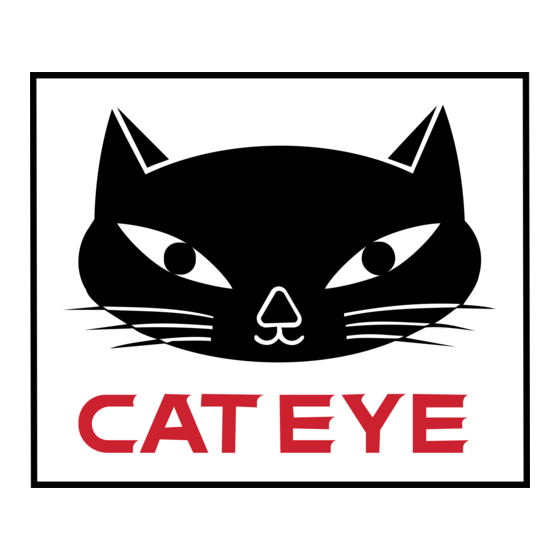
Summary of Contents for Cateye OHR-30
- Page 1 Optical heart rate sensor OHR-30 Parts names Wrist band Optical sensor Button Contact LED indicator 1. Before use: How to charge 2. Pairing 3. Using the optical heart rate sensor Handling and Support Copyright© 2020 CATEYE Co,.Ltd.
- Page 2 When disposing of the product, remove the internal rechargeable battery and dispose of it according to local regulations. Important When using this sensor with a CATEYE computer, the heart rate display will flash when the remaining battery power is low. Recharge the sensor if the computer's heart rate display starts flashing.
- Page 3 Continuous operating time Approx. 8 – 10 hours * When your PC is in sleep state, the unit may not be charged. * Charging and operating times are approximate values, and will vary by environmental and user conditions. Copyright© 2020 CATEYE Co,.Ltd.
- Page 4 To pair the sensor directly to the computer without a smartphone, refer to your computer’s online manual or instruction manual. The Cateye Cycling™ smartphone app (free) must be installed on the smartphone to be used in advance. If using an iPhone If using an Android smartphone * For the latest information on the smartphones that are compatible with Cateye Cycling™...
- Page 5 When Cateye Cycling™ detects the sensor signal, a message will be displayed on the smartphone. Tap [Pair to Device]. The verified sensor (CATEYE OHR-30) is displayed under [Device] and pairing is completed. * When pairing a sensor with the Cateye Cycling™ app an “A” is displayed after the sensor name (HR).
- Page 6 Important • When using the smart computer in Sensor Direct Mode: Connect the smart computer to Cateye Cycling™, and then transmit the paired sensor information. STRADA SMART/PADRONE SMART: Connecting smart computer and smartphone PADRONE SMART+: Connecting smart computer and smartphone •...
- Page 7 OHR-30 1. Before use: How to charge 2. Pairing 3. Using the optical heart rate sensor Wear the optical heart rate sensor on your arm. Before wearing the heart rate sensor Warning!!! Never use this device if you are using a pacemaker.
- Page 8 (wrist, forearm, upper arm). 3. After measurement is complete, turn off the power of the heart rate sensor. Press and hold the heart rate sensor button, and release your finger when the LED indicator turns red. Copyright© 2020 CATEYE Co,.Ltd.
- Page 9 Handling and Support Optical heart rate sensor OHR-30 Warning!!! / Caution! Warning!!! Never use this device if you use a pacemaker. Caution! Be careful that metal objects do not touch the contacts of the charging cable connector of the optical sensor. This could lead to an electrical short circuit and damage the device.
-
Page 10: Specifications
Specifications Batteries used Lithium-ion polymer battery 50 mAh Continuous operating Approx. 8 – 10 hours time * The continuous operating time is approximate and will vary according to environmental and user conditions. Standard charging time Approx. 1.5 hours * The standard charging time is approximate and will vary according to environmental conditions during charging. -
Page 11: Product Warranty
If the product fails to work due to normal use, CatEye will repair or replace the defect at no charge. Service must be performed by CatEye or an authorized retailer. To return the product, pack it carefully and enclose the warranty certificate (proof of purchase) with instruction for repair. - Page 12 Federal Communication Commission Interference Statement This equipment has been tested and found to comply with the limits for a Class B digital device, pursuant to Part 15 of the FCC Rules. These limits are designed to provide reasonable protection against harmful interference in a residential installation. This equipment generates, uses and can radiate radio frequency energy and, if not installed and used in accordance with the instructions, may cause harmful interference to radio communications. However, there is no guarantee that interference will not occur in a particular installation. If this equipment does cause harmful interference to radio or television reception, which can be determined by turning the equipment off and on, the user is encouraged to try to correct the interference by one of the following measures: . Reorient or relocate the receiving antenna. . Increase the separation between the equipment and receiver. . Connect the equipment into an outlet on a circuit different from that to which the receiver is connected. . Consult the dealer or an experienced radio/TV technician for help. FCC Caution: To assure continued compliance, any changes or modifications not expressly approved by the party responsible for compliance could void the user's authority to operate this equipment. (Example ‐ use only shielded interface cables when connecting to computer or peripheral devices). FCC Radiation Exposure Statement This equipment complies with FCC RF radiation exposure limits set forth for an uncontrolled environment. This transmitter must not be co‐located or operating in conjunction with any other antenna or transmitter. This device complies with Part 15 of the FCC Rules. Operation is subject to the following two conditions: ...
- Page 13 Industry Canada Statement This device complies with Industry Canada licence‐exempt RSS standard. Operation is subject to the following two conditions: (1) this device may not cause interference, and (2) this device must accept any interference, including interference that may cause undesired operation of the device. Le présent appareil est conforme aux CNR d'Industrie Canada applicables aux appareils radio exempts de licence. L'exploitation est autorisée aux deux conditions suivantes : (1) l'appareil ne doit pas produire de brouillage, et (2) l'utilisateur de l'appareil doit accepter tout brouillage radioélectrique subi, même si le brouillage est susceptible d'en compromettre le fonctionnement. IC Radiation Exposure Statement: This equipment complies with IC RSS‐102 radiation exposure limit set forth for an uncontrolled environment. Cet équipement est conforme aux CNR‐102 d'Industrie Canada. ...



Need help?
Do you have a question about the OHR-30 and is the answer not in the manual?
Questions and answers